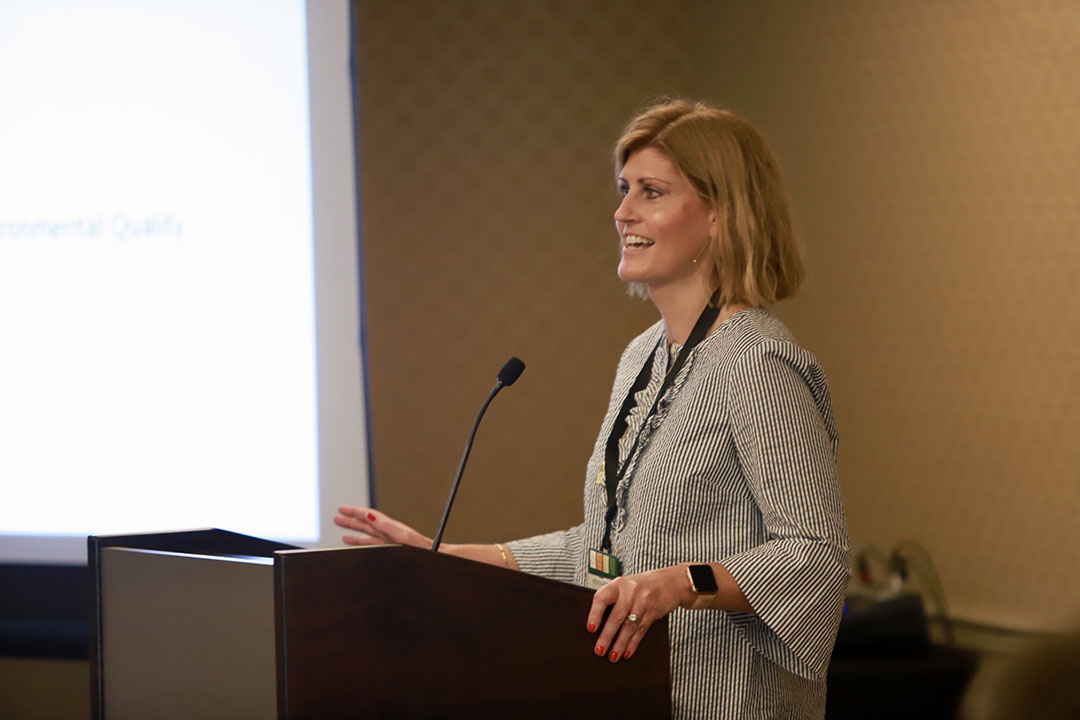Measurement continues to be a key theme at the Resource Recycling Conference


The Resource Recycling Conference (RRC) returned to the Big Easy this year to continue the conversation about materials management practices and to discuss the latest measurement tools and initiatives. Measurement continued to be a strong theme at RRC and the Re-TRAC Connect team is always excited to talk about data.
The conference kicked off with the Measurement Matters Workshop delivered by the U.S. EPA and Re-TRAC Connect. Day two included the Tracking Progress plenary session which featured a presentation by Chris Ronson about the analytical power of the Municipal Measurement Program. As always, we brought Party-TRAC back to New Orleans for an evening of bowling and great conversation.
Measurement Matters Workshop
Municipal Measurement Program
Over 130 conference attendees joined us for the 7th annual Measurement Matters Workshop to discuss the progress being made at the local, state, and national levels to standardize measurement and harmonize the way we talk about materials management.
The first half of the workshop demonstrated how the Municipal Measurement Program (MMP) is being used by multiple levels of government to streamline and standardize measurement across the United States. Jason Blasiola, Superintendent of Streets & Sanitation for the City of Sheboygan (WI) shared his experience participating in the MMP and highlighted a few insights he gained from the program's analytical reports.
Attendees then heard from Jennifer Milner, the State Recycling Coordinator for the Mississippi Department of Environmental Quality. She explained how she uses the MMP's Government Data Management Plan to measure progress being made towards achieving their 25% statewide waste reduction goal. She also described how she plans to use MMP data to select state grant recipients.

Next came The Recycling Partnership's Scott Mouw who spoke about the importance of standardized measurement and data verification. He explained how the MMP's standardized program assessment surveys support national-level data analyses. By building a large-scale national database of municipal program information, we can begin to validate or disprove existing hypotheses about waste management challenges.
Attendees were given an early look at a few new MMP features coming in 2020. The highlights included county/regional government agency participation, region-specific benchmarking, and the GHG equivalencies report, which is based on the U.S. EPA's Waste Reduction Model (WARM).
The first half of the workshop concluded by surveying all attendees about what they'd like to see added to the MMP in future years. The results indicated that attendees want the MMP to collect more data about the industrial, commercial, and institutional (IC&I) sector.
Municipalities
If your municipality needs a better way to measure waste and recycling program performance, apply to join the Municipal Measurement Program today.
States and Counties
Does your state or regional government agency need a better way to measure municipal program performance? Learn how the Government Data Management Plan can connect your agency with MMP data.
EPA Update
Environmental Protection Specialist, Kent Foerster, opened the second half of the workshop by reminding attendees about how far these sessions have come. The early Measurement Matters sessions had only a handful of participants but it has now grown to over 100 participants each year. He wrapped up by announcing that the results of the State Measurement Program would be shared during a webinar scheduled for September 19th.
Ron Vance, Chief of Resource Conservation Branch at the U.S. EPA, announced that the America Recycles Day working group is currently working on a project to update the state and local government recycling guide. A task force has already been assembled, including members from various industry groups, to revisit the definition of recycling, provide an update on key performance metrics, and map the recycling system.
The workshop concluded with a roundtable discussion to learn which key performance metrics attendees used to measure recycling performance, and why they felt these metrics are important. Attendees identified contamination rate, diversion rate, and recycling rate as the top three metrics they currently use to measure success.
Tracking Progress Plenary
Attendees looking for their afternoon "data fix" joined Malak Anshassi (Graduate Research Assistant, University of Florida), Minal Mistry (Business Initiatives Representative, Oregon Department of Environmental Quality) and Re-TRAC's Chris Ronson to explore a range of approaches to data collection and goal-setting in the industry.
Malak shared her progress towards using different Florida DEP data sets to assess the State's progress towards achieving success. This meant going beyond diversion rates and evaluating GHG equivalencies separately. She introduced the "Life Cycle Impact Factor" which combines diversion rates and GHG impacts into a single metric.
Chris provided insight into the power of the Municipal Measurement Program (MMP) by sharing some initial results from data that had been collected to-date. While the data was classified as unverified, opportunities to begin analyzing aggregated municipal data at the county, state, and national level got one step closer. Chris also announced the December 1st, 2019 deadline for municipalities to submit their 2018 data to the MMP so that it will be included in the final verified data set.
Minal closed out the session sharing Oregon DEQ's approach to ensuring their state was making progress towards their ultimate goal of conserving resources, protecting the environment, and "living well". He explored life cycle impacts as they related to material attributes, encouraged us to look at the big picture and include impacts (not just diversion) and demand design optimization for life cycle impacts.
Party-TRAC
Party-TRAC (or Mardi-TRAC) returned to at Fulton Alley this year to enjoy friendship, conversation, and a great community. We celebrated birthdays with beignets and bowled the night away.
The Fulton Alley staff were very helpful and they kindly collected all the empty cans generated by our event so we could coordinate a recycling pick-up after the event. Fortunately, Matt Torri, Deputy Director the City of New Orleans' Department of Sanitation, attended the Measurement Matters workshop so we arranged for the city to pick up the cans the morning after our event.

See you next year in Austin, TX
With another great conference behind us, we look forward to RRC 2020 in Austin, Texas.